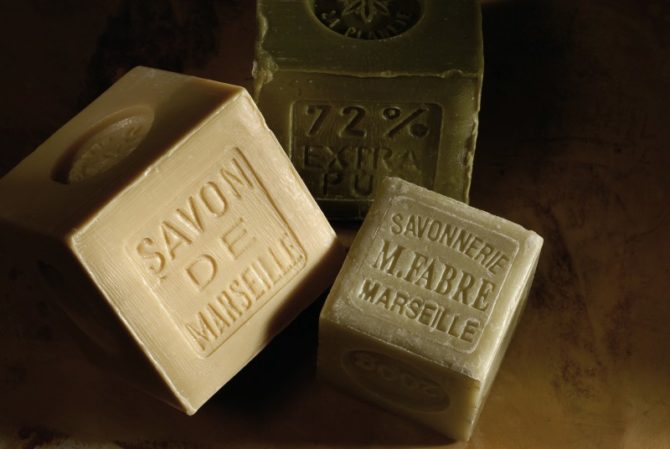Super Soap

A Best of France selection.
Famous though it is, savon de Marseille does not have an official French AOC, but its production was codified in 1688 in an edict by Louis XIV, which stipulated that no butter or other animal fats could be used in the soap mixture, but “only pure olive oil”—anything else and “the merchandise will be confiscated”. Among many other things, the edict also ordered production stopped during the summer, because heat affected the quality of the oil, and forbade the use of fresh oil before the first of May, giving the oil time to mature after the annual mid-winter pressing. Anyone caught breaking the rules four times, the edict declared, would be banished from Provence.
Soap was produced in Marseille as early as the 12th century, since the city had easy access to the principal ingredients: olive oil and soda, which at first came from the ashes of salicorne, or sea-asparagus, that grew in the salt marshes of the Camargue. With the development of shipping and later railroads, and modern notions of hygiene, the Marseille soap industry enjoyed a golden age in the 19th century, and only began to decline in the mid-20th, with the arrival of detergents and washing machines. Today only a handful of traditional savonneries in Marseille and nearby Salon-de-Provence continue to produce authentic savon de Marseille.
The basic process takes some two weeks from start to finish. The oil (usually olive, palm or coconut) and soda are mixed in huge cauldrons or vats to produce soap paste, which is then liberally rinsed with salt water to remove the excess soda. The mixture is then “cooked” for about ten days, and rinsed in fresh water. The hot paste is poured into cooling tanks and then into molds, where it starts to dry. After two days, the half-dried soap is cut into huge blocks, then cut again into smaller cubes or bars, which are set out on shelves to finish drying before being hand- or machine-stamped. The traditional cubes are stamped on all six sides, the hallmark of savon de Marseille, and the stamp guarantees that the soap contains at least 72 percent of natural vegetal oil. The exact formulas for each soap—with added fragrances and ingredients such as shea butter or honey—are the secret of each soapmaker. Containing only natural ingredients and perfectly biodegradable, savon de Marseille seems poised for a comeback in an ecologically conscious world.
Authentic savon de Marseille is still made by Marius Fabre, founded in 1900 and now run by the third generation, in Salon-de-Provence; Rampal-Latour, founded in 1828, in Salon; and the Savonnerie de la Licorne in Marseille.
Originally published in the December 2008 issue of France Today.
Share to: Facebook Twitter LinkedIn Email



